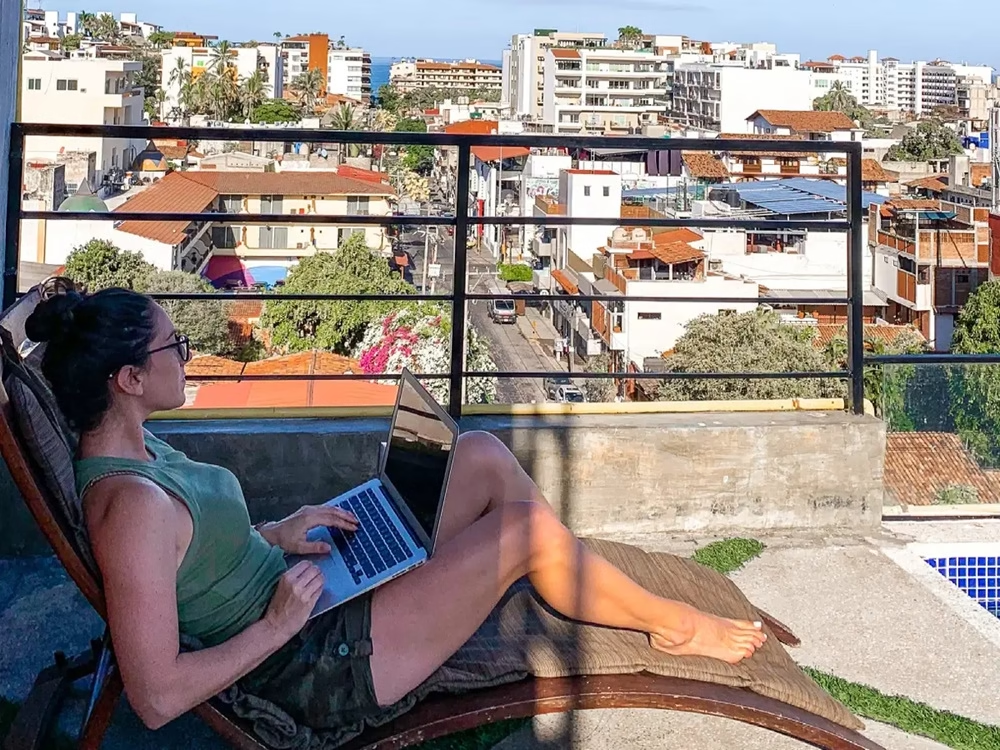Remote workers do not need a 12-month lease to feel at home. With long-term Airbnb stays, they can live in a real neighbourhood, keep costs under control, and move on when work or seasons change. The key is doing it right, by the book, and with respect for hosts and local rules.
In 2025, monthly stays on Airbnb are common. Monthly discounts for 28 or more nights cut costs, and monthly payment options spread out cash flow. Planning also got easier this year. New listings no longer use the “Strict” cancellation policy, which changes how guests plan multi-month stays.
This guide shows how to live quietly, legally, and respectfully for months at a time. It covers why long-term Airbnbs work, how to find and book the right place, rules and tenant rights to know, daily living tips that keep hosts happy, and smart destinations and budgets. Simple checklists and ready-to-use scripts are included, so readers can act today.
Why long-term Airbnbs appeal to remote workers in 2025
For many remote workers, long-stay Airbnbs feel like flexible furnished leases without the hassle. There is no furniture to buy, utilities are usually included, and move-in is fast. If a city or unit is not a fit, they can pivot at the end of the month and try a neighbourhood.
Monthly discounts often cut nightly rates once a stay hits 28 nights. That puts long-term Airbnb prices close to, or below, a short lease after adding deposits, furniture, utilities, and internet. Airbnb’s monthly payment schedule also helps with cash flow. Instead of a big upfront hit, payments can align with paydays.
Hosts often like long stays too. Turnover drops, calendars stabilize, and cleaning cycles are predictable. That can open the door to reasonable negotiation on price or dates, especially in shoulder seasons. For a broader view of how hosts think about extended bookings, see this practical guide to long-term Airbnb rentals in 2025.
Planning got smoother in 2025. New listings do not use “Strict” cancellation, and many default to “Firm” or more flexible policies. That gives guests better options for changing plans, but it still pays to read the fine print.
There are honest downsides. Inventory can be tight in some cities. Local rules may change the deal after 30 nights. Cleaning fees, parking fees, or utility caps can raise the total. A careful review of the price breakdown prevents surprises.
When long-term Airbnb living shines:
- Test-drive a city before signing a lease
- Take a 12-month project
- Wait for a new lease start date
- Escape peak winters or summers
- Live near family or a client temporarily
Monthly discounts and payments, how costs compare to leases
For stays of 28 or more nights, hosts often apply a monthly discount. The discount lowers the nightly rate, then monthly billing spreads the total across the stay. Here is a simple sample.
Sample listing math:
- Nightly price: 120 dollars
- Monthly discount: 25 percent
- Discounted nightly: 90 dollars
- 30-night subtotal: 2,700 dollars
- Cleaning fee: 150 dollars (one-time)
- Airbnb service fee: 200 dollars (varies)
- Occupancy taxes: 12 percent on rent, 324 (varies by location)
- Estimated first month total: 3,374 dollars
Compare that to a short lease:
- Rent: 2,400 dollars per month
- Security deposit: 2,400 dollars
- Furniture and kitchen basics: 1,000 to 2,000 dollars
- Utilities and internet setup: 200 to 300 dollars per month
- Time cost and risk: high, if plans change
For 1 to 3 months, a long-stay Airbnb can be cheaper and lower risk when you add deposits, furniture, and setup costs. Prices and discounts vary by city and season, so always compare total cost, not just the nightly rate.
2025 cancellation policy changes, what that means for long stays
Starting in October 2025, new Airbnb listings stopped using the “Strict” policy. Most now use “Firm” or another flexible policy. There is also a standard 24-hour cancellation window for bookings made at least seven days before check-in. A new “Limited” policy gives a full refund up to 14 days before check-in, 50 percent between 7 and 14 days, and no refund within 7 days.
What this means for month-plus stays:
- Better flexibility for early changes, but always check the listing’s specific policy
- Confirm the exact refund window in writing
- Ask about the first-month nonrefundable terms
- Clarify what happens if plans change mid-stay or if an extension is needed
Put the dates and refund cutoffs on a calendar the day the booking is made. That simple step prevents costly last-minute changes.
Pros and cons for work and life
Pros:
- Furnished home with a kitchen and laundry
- Fast move-in, no utility setup
- Location flexibility across neighbourhoods
- Often cheaper than hotels for long stays
- Monthly discounts reduce cost
- Easy to try a new city or move with the seasons
Cons:
- Tenant rules may change after 30 nights
- Limited inventory in heavily regulated cities
- Cleaning or utility caps can add cost
- House rules may restrict guests or mail
- Internet quality varies, needs checking
Simple tip: if speed and flexibility matter more than full control, long-term Airbnb living fits well.
How to find and book a long-term Airbnb the smart way
A clear system saves time and money. Start with tight filters, then confirm the work setup, then secure a fair price. Keep communication polite and exact.
Search filters and keywords that surface monthly stays
Use these filters:
- Length: 28+ nights
- Entire place
- Kitchen and washer
- Dedicated workspace
- Self check-in if desired
Sort by total price, not just nightly rate. Read recent reviews first. Use keywords like “monthly discount,” “28 nights,” “long term,” “quiet street,” and “strong WiFi.” Check the map for groceries, gyms, parks, and public transit. If commute matters, map the route at peak time.
Verify WiFi, workspace, and essentials before booking
Checklist for remote work:
- Internet speed: at least 50 Mbps down and 10 Mbps up for video calls; 100/20 is better
- Desk and chair with back support
- Enough outlets near the desk
- Good lighting that does not create glare
- Backup fan or AC if the climate runs hot
- Noise level inside and outside during work hours
Ask for a speed test screenshot and the internet provider. Confirm kitchen gear, laundry, and parking. Ask about shared walls and quiet hours. If unsure, book a 30 to 45-day trial before committing to a longer block.
For extra tips on finding fast WiFi and negotiating like a pro, this guide for remote workers offers practical tactics: Airbnb tips for remote workers in 2025.
Message and negotiate with hosts for better monthly rates
Short script that works:
- “Hi [Name], I’m looking at [dates] for [X] nights. I work remotely and need strong WiFi and a quiet space. Your place looks perfect because of [reason from listing]. Could you share a speed test screenshot and confirm the desk and chair setup?
- If the dates are open, I can book today. Would a Special Offer be possible for [length of stay], or if I start on [flexible start date]? I’m tidy, quiet, and I pay on time. Happy to follow house rules. Thanks for considering.”
Be polite, clear, and ready to book. Hosts often prefer reliable month-plus guests, especially off-peak. Keep all key agreements inside Airbnb messages.
Understand pricing, fees, and cancellation terms.
Always confirm the full price:
- Nightly rate after the monthly discount
- Cleaning fee
- Airbnb service fee
- Occupancy and local taxes
- Any deposit or pre-authorization
- Utility caps or overage fees
- Pet fees or parking fees
Revisit the 2025 policy shift. New listings use “Firm” or other flexible policies, not “Strict.” Note the 24-hour grace window and the refund timelines. Confirm first-month commitments and the cost to change dates before booking.
Rules, laws, and tenant rights that can surprise long-term guests
Laws change after longer stays, and those rules vary by city. In many places, a stay of over 30 nights can cross into tenant territory. That often means notice rules and added protections. It can help if treated fairly, but it also adds complexity if someone needs to move early or if a dispute arises.
The smartest play is transparency. Keep agreements in writing inside Airbnb messages, follow house rules, and choose listings that are compliant with local law. Avoid workarounds to zoning or caps. Playing by the rules prevents fines and sudden cancellations.
What changes after 30 nights, tenant rights basics
Once a stay hits 30 nights in some areas, guests can gain rights similar to tenants. That may include:
- Notice periods for ending a stay
- Eviction protections
- Different dispute or mediation channels
Action steps:
- Read local guidance before booking
- Confirm in messages what happens if you leave early or extend
- Keep receipts and document important conversations
- Save photos and timestamps for any property issue
City rules, ADUs, and nightcaps to watch (example: Los Angeles)
Cities may limit short-term rentals or require permits. Some have nightcaps per year unless the host has a permit. In Los Angeles, accessory dwelling units (ADUs) are not allowed for short-term rental use, and the city enforces caps and registration rules. Book places that follow local rules. It protects both the guest and the host, and it reduces the risk of a sudden cancellation.
Write clear terms, guests, mail, and quiet hours to avoid conflict
Before booking:
- Confirm visitor rules and extra guest policies
- Ask how mail and packages are handled
- Check parking, pets, and quiet hours
- Get any extra fees in writing
- Keep all key decisions inside Airbnb messages
Quick, friendly communication builds trust and speeds up fixes when something breaks.
Live quietly and respectfully for months without issues
Living “quietly” means following the rules and being a good neighbour. Keep noise low, respect trash days, park only where allowed, and follow building rules. Report issues early so small problems do not grow. If utilities have caps, conserve to avoid extra charges.
For remote work, set up a stable desk and use wired internet when possible. Keep a backup plan for calls. Handle mail and deliveries cleanly. Use door locks carefully, and do a basic safety check on day one.
Internet and power backup for reliable remote work
A small toolkit pays off:
- Travel router and an Ethernet adapter
- 25 to 50-foot Ethernet cable
- Noise-canceling headset
- Compact battery bank for short outages
- Mobile hotspot plan as a backup
At check-in, run a speed test and a quick 10-minute video call. Adjust the setup if needed. Know the nearest coworking space for heavy days.
Handling mail, packages, and address needs legally
Ask the host if packages are allowed. If not, use lockers, pickup points, or a virtual mailbox service. Do not set Airbnb as a permanent address if house rules forbid it. Keep deliveries small, pick them up fast, and keep common areas clear. That avoids conflict with neighbours and building staff.
Safety, insurance, and what AirCover does not include
On arrival, check door and window locks, smoke and carbon monoxide detectors, and exits. Airbnb’s protections focus on hosts and the booking, not a guest’s personal property or medical costs. Consider travel medical coverage and device insurance. Record serial numbers and use a cable lock for laptops if you work in shared spaces.
What to do when things go wrong, from repairs to early exits
Stay calm and factual:
- Document the issue with photos and timestamps
- Message the host right away
- Propose fair fixes or a timeline
- If needed, escalate through Airbnb support
If a move is required, ask about refunds under the listing’s policy. Be polite and firm. Most issues resolve faster with clear documentation and simple requests.
Best places and budgets for long-term Airbnb life
Cities with friendly rules, good internet infrastructure, and active host communities tend to have more long-stay options. Season matters. So does demand from events and snowbird patterns. Pricing tactics can also change availability. Hosts adjust for long stays or midweek gaps, which can help guests find deals, as seen in this overview of remote work’s impact on Airbnb pricing.
Popular remote work cities in 2025 to consider
- Austin: strong tech scene, lively neighbourhoods, many furnished options
- Miami: fast internet in many buildings, winter sun, active monthly market
- Denver: outdoor access, balanced seasons, solid apartment supply
- Los Angeles: huge market but regulated; prioritize compliant listings and verify permits
Match choices to weather, interests, and flight cost. Availability and discounts shift by season, so check dates across a few weeks to find price dips.
Build a monthly budget that avoids surprises.
Plan a simple budget with a small cushion. Track weekly, then adjust next month.
Budget lines:
- Rent after r monthly discount
- Cleaning fee
- Airbnb service fee
- Taxes and local occupancy fees
- Utilities or caps and overages
- Coworking or coffee shop spend
- Transport and parking
- Gear or repairs
- 10 to 15 percent buffer
Here is a quick table for a typical month.
| Cost Item | Example Amount |
|---|---|
| Discounted rent (30 nights) | $2,700 |
| Cleaning fee | $150 |
| Service fee | $200 |
| Taxes and fees | $324 |
| Utilities overage buffer | $50 |
| Coworking/coffee | $120 |
| Transport/parking | $160 |
| Gear/repairs buffer | $60 |
| Total estimated | $3,764 |
Adjust by city and season. Keep receipts to compare options next time.
A simple three-month rotation that fits visas and seasons
A short rotation keeps things fresh and legal:
- Month 1: test a neighbourhood for 30 to 45 days
- Month 2: extend in place if it works, or try a nearby city
- Month 3: switch regions for better weather or lower prices
For international trips, check visa lengths and avoid overstays. Confirm local rules before booking the next leg, since tenant rights and taxes can change after 30 nights.
Conclusion
The playbook is simple. Use monthly discounts and smart filters, verify WiFi and workspace, confirm house rules and cancellation timelines, understand tenant rights after 30 days, and live respectfully. In 2025, more flexible cancellation for new listings helps planning, but local law sets the boundaries. Plan a month ahead, communicate clearly, and pick compliant listings. Ready to go? Choose a city, send three friendly messages to hosts today, and start working with less stress and more freedom.

















